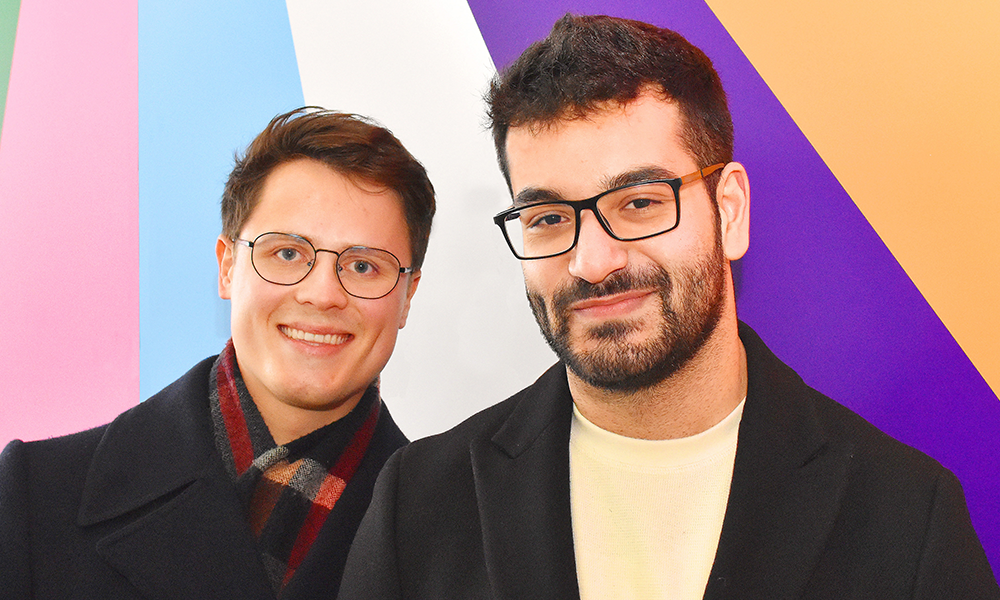Jan Gasiewski and Ali Youssef created the Level39-based firm after meeting at UCL on the estate

Subscribe to our Wharf Whispers newsletter here
Business is all about relationships and it’s pretty clear there’s real strength at the heart of Level39-based Skillwork.
It’s also emblematic of how London provides the crucible that allows individuals to come together, fused and more powerful as a consequence.
In a nutshell, Skillwork provides software development services to startups, small firms and corporates looking to run innovative breakaway projects that fall outside their main areas of operation.
But at its heart lies much more than technical prowess. It’s the enthusiasm, energy and passion of two men – co-founders Jan Gasiewski and Ali Youssef.
From Poland and Bulgaria respectively, the pair met and founded the business in 2020 while both studying for their masters degrees in entrepreneurship at University College London’s School Of Management in Canary Wharf’s One Canada Square.
Both had previously studied in the UK – at Lancaster (Jan, business administration) and Northampton (Ali, computer software engineering) – before heading to the capital with perhaps a sense of something unfinished.
“Lancaster is a great university,” said Jan.
“But what you need if you want to go into business is exposure and the nearest city is Manchester. Even that is just far away enough that nobody goes.
“I’d applied for placements at Microsoft and HP. At the assessment centre for the former I didn’t know how to approach it – everyone just said: ‘Be yourself’.
“But the feedback was that all the product work was done in the States and that I didn’t show much human emotion, so I got into HP instead.
“It remains my only ‘real’ job, but there wasn’t much work to do so I wound up mostly reading books rather than getting experience.”
Ali said: “I’d gone back to Bulgaria, thinking I was going to be a software engineer and I got a job.
“But on the day I was supposed to start, I called the guy and said that I didn’t want to do it.
“Then I told my dad that I wanted to study entrepreneurship instead and his response was that business courses were for people who didn’t know what they wanted to do in life.
“But I applied to UCL, got in and that was my first experience of London – coming to Canary Wharf I was so shocked because I had never seen a place like it in my life.
“It was a place you could talk to anybody – I was having a coffee with a guy and he turned out to be a fund manager in control of millions of dollars.
“When he asked me what I did, I had to say I was a student.
“In Bulgaria I thought people like these were superheroes that I would never meet in real life.
“But London showed me you could talk to people who were very successful. It changed everything.”
Jan, in a “rare display of extroversion” messaged his course mates at UCL to see if any of them would be up for meeting over a drink.
Ali was the only respondent, and they bonded over food at Honest Burgers swapping tales of their fathers.

“Both our dads had businesses,” said Jan.
“We both grew up looking up to them and both were screwed over quite badly by their business partners.”
Their friendship flourished and they decided to go into business together, with Skillwork founded in 2020 while they were still studying at UCL.
Now based at Canary Wharf’s tech community, Level39 at One Canada Square, it employs some 17 people in London and Bulgaria.
“We always say our partnership is the cornerstone of the business,” said Jan.
“Because of our fathers’ experiences, we created a set of rules when we started to ensure that nothing like that could happen to us.
“We are very transparent with each other and love working together.”
“We really wanted to be very entrepreneurial from the start,” said Ali. “We were surrounded by people in that environment both at UCL and at home.
“It’s also about an acceptance of potential failure and an appetite for risk.
“To start with, we had no experience, so we decided to plug ourselves into the world of startups and build up knowledge as we went, using that as a catalyst to create something.
“Today we work with small businesses and corporate innovation labs and the core of what we do is software development for those clients.
“We like to mix pragmatism with technology.
“You get people who come to us all guns blazing saying that they’re going to build an AI model to do something incredible but they haven’t yet got any traction.
“So we might apply the brakes there and persuade them to go one step at a time. On the corporate side, we are leaning towards what’s called venture building, where a big company decides it needs, for example, a digital presence, and brings in help from outside to help it develop one.
“So we sit down and discuss with them problems which they are interested in solving, and then we help them to see what ideas might be a potential business plan.
“Then we help them build that product up, and then they take it over and run it.
“We’ve been around now for a little over three years and in that time we’ve been able to work with the likes of pharmaceutical giant GSK and fusion power company Helion.
“We’ve also managed to build all this without any investment. We now have employees who rely on us and fortunately we have a good, strong network of mentors.
“Generally speaking what’s happened is that our success comes from our clients’ success.
“We’ve worked with the majority of our clients since day one and many have seen a huge degree of success.
“They’re all big-name people, so it’s all going very well as far as our reputation is concerned.
“We’re now in a much healthier position, with strong cash-flow and a sound profit margin. We’re now looking outwards to expand.”
While Skillwork’s technical operations take place in Bulgaria, London remains key to the business’ plans for growth.
Having studied at UCL on the 38th and 50th floors of One Canada Square remaining in the tower was a natural step.
“It was quite prestigious for us to come to Level39 – it was a marketing thing as well, because meeting clients here makes a good impression,” said Jan.
“I also think it’s one of the best spaces in London. If your working environment is good, then your work will be good and we’re very fortunate that we can afford to be here. We have some clients in Dubai and that might be a place we expand into.
“Our strength lies in the fact that we have contacts in so many countries and the ability to access them.
“One thing to remember is the UK is and always will be a global power.”
Ali added: “That was the key benefit for us of coming to the UK – when we came here, we were exposed to all these different cultures.
“London isn’t going to go under anytime soon. The reason we’re looking outwards is that we’re a bootstrap business, with not too much cash in the bank, so we have to keep expanding.
“There are only two choices – you go up or you go down. Out next step is to become innovation leaders in the Middle East for anything digital – that’s our ambition.”
Who would bet against them?
Read more: See the moment One Canada Square was topped out
Read Wharf Life’s e-edition here
Subscribe to our Wharf Whispers newsletter here
- Jon Massey is co-founder and editorial director of Wharf Life and writes about a wide range of subjects in Canary Wharf, Docklands and east London - contact via jon.massey@wharf-life.com



